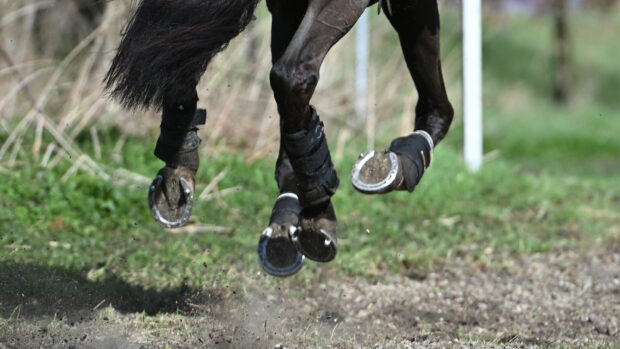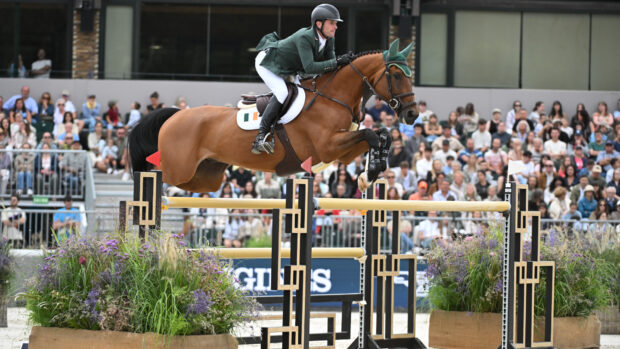A rider who “escaped”, and “ran away” when FEI officials wanted to take a mandatory sample for dope-testing after his horse failed a hyposensitivity test, has been suspended for two years.
The FEI Tribunal has ruled on the case of Saudi Arabian rider Ayedh Al Maghamer, in relation to a charge of evading, refusing or failing to submit to sample collection, with eight-year-old Talaqah at a CEI1* endurance ride in Saudi Arabia on 11 February this year.
“The horse was selected for a mandatory in-competition doping control test after the failed hyposensitivity examination but the PR [person responsible, Al Maghamer] refused testing and escaped with the horse, which prompted these proceedings,” the Tribunal report states.
Hyposensitivity testing involves monitoring a horse’s reaction when pressure is applied to a limb using a blunt “pin” in three tests. Under FEI rules, if the horse does not react to a set level of pressure, he is marked as hyposensitive and disqualified. This leads to a mandatory four-week stand-down period from competition for the horse, plus dope-testing to check for nerve-blocking agents, among other possible substances.
In Al Maghamer’s case, the FEI officials said the rider “insisted on being retested” after the standard three tests.
“He then ran away from the steward accompanying him to EADCMP [equine anti-doping and controlled medication programme],” the official’s report stated. “He refused EADCMP testing.”
The officials’ report added that Talaqah was “too fractious to test” at the first two vet gates, and “could not be approached safely”, but at the third vet gate, the officials “decided he must be tested”.
“The groom restrained by applying a hand lip twitch,” the report states. “We could then safely apply the boots and actuators. The groom released his hand from the horse’s lip, so the horse was not restrained in any way during the test. After being informed that his horse had abnormal findings (in the hyposensitivity testing) in his left foreleg and was disqualified,, the PR was angry and kept requesting further testing, which we politely refused. He was accompanied by a steward and a national judge for EADMCP but refused testing and escaped with his horse.”
The FEI said the ground jury told Al Maghamer of the consequences of failing to submit the horse for sample collection but “nonetheless, the PR disappeared with his horse, which resulted in the impossibility to conduct an in-competition test”.
The only submission from Al Maghamer in relation to the proceedings was: “I objected to the committee’s decision regarding the fine and suspension, because the committee present at the race did not inform me that a blood sample had been taken from the horse. They only said exclusion because the horse did not sense the sensitivity device, and the passport was received and the chip was handed over, and the committee did not inform me of the analysis.”
The Tribunal was “comfortably satisfied” that Al Maghamer had breached anti-doping rules, stating: “The Tribunal agrees with the FEI that evading, refusing or failing to submit the horse to sample collection is a very serious offence. Indeed, the entire anti-doping system, as well as the integrity and credibility of the equestrian sport, relies on the cooperation and abidance by the rules, of all participants in the context of the testing procedures.”
The Tribunal ruled that the combination be disqualified from the event. Al Maghamer was banned for two years, fined CHF7,500 (£6,848) and ordered to pay CHF2,000 in costs.
Hannah Bradley, solicitor at The Equine Law Firm, told H&H FEI rules make it clear that failure to submit a horse for sample collection is a serious matter.
“The indicative period of ineligibility in the rules for evading sample collection is significantly higher than the indicative period of ineligibility for a positive controlled substance test, and equal to the indicative period of ineligibility for a positive banned substance test,” she said.
“It is also important to note that the FEI’s equine anti-doping rules apply a ‘strict liability’ principle to rule breaches. This means that unless the person responsible can prove that they bear “no fault or negligence” they will be liable for the violation, even if the breach of the rules was accidental.
“The outcome of this case is a reminder to parties to cooperate promptly with disciplinary investigations and to seek advice, where possible. Whilst the substantive outcome of this tribunal may not have been different had the respondent given his full cooperation, he would have likely received a reduced fine.”
You might also be interested in:

Cautious hope hyposensitivity testing is leading to ‘changed mentality’ in endurance

Endurance rider whipped horse ‘because it was lonely’
The ‘promising young rider’ used an extra pair of reins to hit his horse

Subscribe to Horse & Hound magazine today – and enjoy unlimited website access all year round
Horse & Hound magazine, out every Thursday, is packed with all the latest news and reports, as well as interviews, specials, nostalgia, vet and training advice. Find how you can enjoy the magazine delivered to your door every week, plus options to upgrade your subscription to access our online service that brings you breaking news and reports as well as other benefits.




